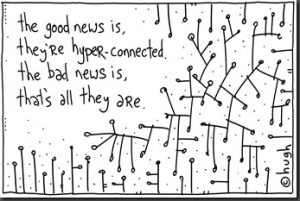 OK, I admit it. Connecting via technology feeds my need to feel somewhat in control of my time, my contacts and my conversations. I love the fact that technology allows me to talk on my office phone, send a text message on my mobile device, and review an email on my computer at the same time. However, beyond the selfish and seemingly productive advantages of being über-connected, I’m seeing all too many disadvantages that are slowly but surely impacting the way we work, our ability to develop as professionals and, ultimately, our success potential. I recently wrote a blog about this topic for the Huffington Post, and I’d like to share an excerpt from that article here.
OK, I admit it. Connecting via technology feeds my need to feel somewhat in control of my time, my contacts and my conversations. I love the fact that technology allows me to talk on my office phone, send a text message on my mobile device, and review an email on my computer at the same time. However, beyond the selfish and seemingly productive advantages of being über-connected, I’m seeing all too many disadvantages that are slowly but surely impacting the way we work, our ability to develop as professionals and, ultimately, our success potential. I recently wrote a blog about this topic for the Huffington Post, and I’d like to share an excerpt from that article here.
Web-based meetings with global teams. Strategy discussions on endless email threads. Social networking with “electronic” associates and friends. While powerful technological advances allow us to make instant virtual connections with our colleagues, they also contribute to a growing problem in business today. Increased connections aren’t the same thing as productive connections. In fact, the decline in strong, effective business relationships is now taking a measurable toll: more careers seem stalled, more teams are struggling to perform, and more companies are suffering because of unproductive working relationships in the office. Ironically, all of those digital connections are creating a serious personal disconnect.
Gone are the days when we would carve out time every Friday morning to meet over breakfast with a seasoned advisor. Our mentors had time to discuss our progress, analyze our interpersonal challenges, even walk us through options for handling difficult situations at work. Today, we rarely have time to reach out for sound advice and candid guidance. With quick rotational assignments, tight deadlines, and geographically dispersed teams with remote leaders, our supervisors may not have the bandwidth or the inclination to provide the kind of support that historically transformed promising professionals into powerful leaders. Even trading meaningful suggestions and insights about our team interactions with co-workers over lunch seems to be a thing of the past.
Clearly, the solution doesn’t involve opting out of virtual assignments or giving up our mobile phones to restore the integrity of our business relationships. But it does mean that we need a more specific and proactive strategy to fuel our advancement – one that allows us to spend more time observing our professional role models and gathering the necessary feedback to maximize our career growth. Here are a few action items to consider when developing your strategy:
- Push beyond the invisible barricades of technology and make a conscious effort to connect on a deeper level with your own team of personal advisors.
- Search for a true mentor, someone at a higher level who knows your work patterns and is willing to provide ongoing counsel.
- Identify peers or leaders who set good examples for productive workplace interactions, paying close attention to their successful behaviors.
- Incorporate those behaviors as you gain a better understanding of what it really means to relate well with others, communicate with influence, and lead with grace.
- Set aside time to develop and nurture relationships with your role models so that gathering feedback about your social fluency becomes a continuous part of your career strategy.
Even if technology continues to depersonalize the business world, the most successful leaders today know the value of investing time and energy to maintain solid business relationships. We can still appreciate and even embrace the advantages of Skype meetings, webinars and social media networking, but we also have to know when and how to sidestep the wonders of technology to advance our careers. We need to proactively find opportunities to engage face-to-face with business associates and genuinely connect with them – to observe their behaviors and get personal feedback after they observe ours. With that kind of support, we can view our professional reputations through the perceptual lens of our colleagues, co-workers and clients. And if we discover that those reputations aren’t helping us reach our goals, we have the information we need to make improvements.
Yes, I love the convenience of technology as much as the next person. Maybe more. But I’ve seen first-hand that technology’s ironic illusion of connectivity can create hidden roadblocks that subtly derail careers. To maximize our professional impact, improve our workplace reputations and create a significant edge in building our careers, we may need to schedule occasional breaks from our computers and iPhones so we can focus on the people who can impact our success.

Truer words never written. Social media both connects and disconnects us. We use it as a crutch and it can make us lazy, shallow and ineffective. Sometimes we even hide behind it. It’s so important to proactively and intentionally carve out time for real-time, in person, mutually beneficial connections, conversations and relationships. Thanks for writing this, Sara. Beautifully said.